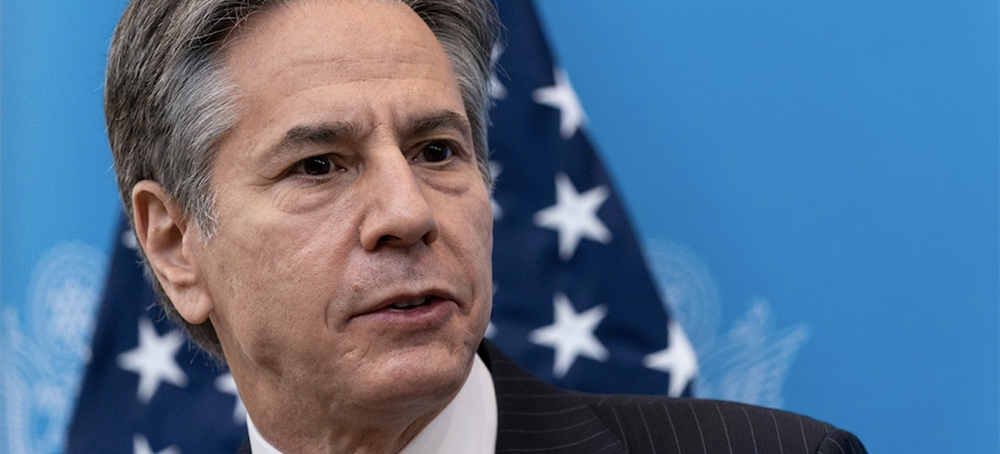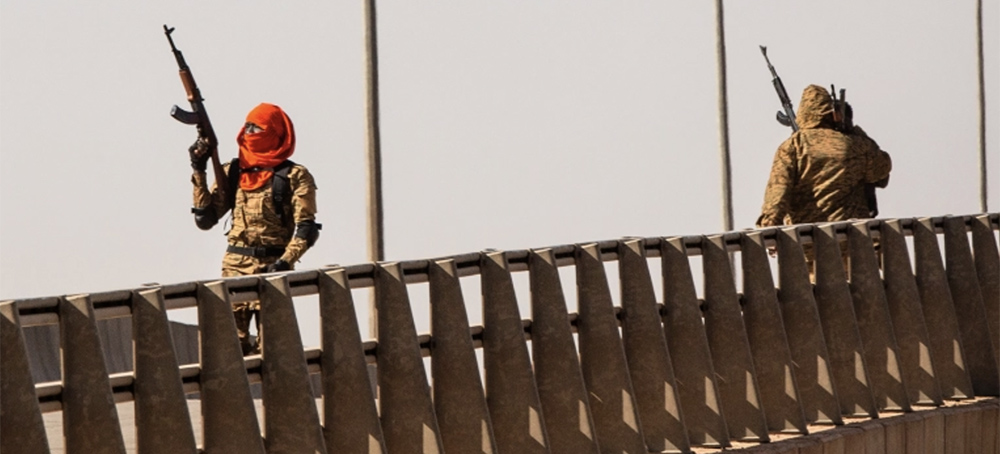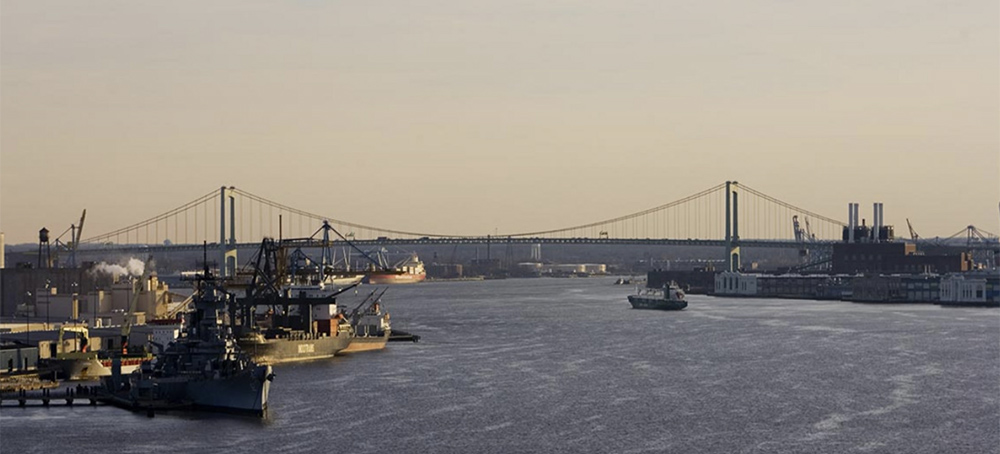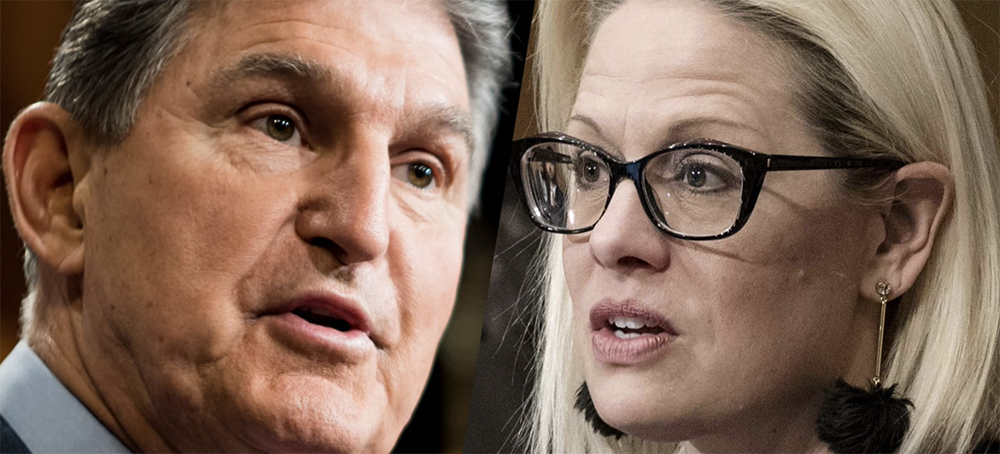Live on the homepage now!
Reader Supported News
Manchin and Sinema’s intransigence on the filibuster helps the Republican party usher in an era of voter suppression and election subversion
The Freedom to Vote Act and the John Lewis Voting Rights Act would together serve to establish a baseline of federal rules enabling access to the ballot in all 50 states, and would restore the congressional authority to oversee new election laws in states that have a history of racist voting restrictions – a civil rights-era provision that was gutted by the Republican-controlled supreme court. But the two bills have been blocked repeatedly by Senate Republicans, who have used the chamber’s supermajority rule to prevent them from coming to a vote.
With the support of President Biden, who endorsed filibuster changes in a speech in Atlanta last week, the Democrats hoped to carve out an exemption that would finally allow the bills to be passed – Sinema and Manchin, after all, had both professed support for the bills themselves, though Manchin’s endorsement had to be cajoled. And exemptions to the filibuster are nothing new: according to Exceptions to the Rule, a book about the filibuster by the governance scholar Molly Reynolds, the filibuster was amended 160 times between 1969 and 2014. Both Manchin and Sinema supported a carve-out to the filibuster just weeks ago, when they both agreed to amend the rule to allow the Senate to raise the national debt ceiling.
But evidently, voting rights are different. Last Thursday, in a tearful speech on the Senate floor, Sinema announced that she would not support changing the filibuster to pass the bills. She called for compromise, and chided Democrats for not doing more to reach out to Republicans to treat the nation’s “disease of division”. For his part, after a meeting with Senate Democratic leaders on Tuesday night, Manchin, too, reiterated that he would not support a voting rights filibuster carve-out, and dismissed fears that Black Americans would be denied the ballot. “The government will stand behind them to make sure they have the right to vote,” Manchin said. “We have that. The things they’re talking about are in court.”
Responsible adults, assessing the state of voting rights in America in good faith, would of course know that neither the Republican party nor the federal courts are partners in the effort to preserve voting rights. Republican-controlled state legislatures have spent years imposing restrictive laws that make it harder and harder for people of color to vote, and have now progressed to making it easier for themselves to discard the voters’ preferences if they choose. These efforts have largely been supported by the federal courts, where Republican partisans in robes have gutted voting protections and given the green light to severe restrictions. It was the supreme court’s evisceration of the 1965 Voting Rights Act, in the cases Shelby County v Holder and Brnovich v DNC, that spurred congressional Democrats to write the John Lewis Voting Rights Act in the first place – the bill that Manchin and Sinema profess to support. The Republican party and much of the federal judiciary won’t preserve the franchise; they’re in fact working in concert to destroy it. Any competent and honest political observer will acknowledge this. That Manchin and Sinema will not suggests that they are either cynical or stupid.
For the past year, Manchin and Sinema have used the filibuster, and the Democrats’ paper-thin majority in the Senate, to flex their own influence, withholding their support on essential measures and hampering the Democrats’ agenda – most recently the Build Back Better Act, the Biden social infrastructure bill that Manchin single-handedly killed in December. They have served primarily as saboteurs, scuttling hopes that a Democratic trifecta in government might yield the actual realization of Democratic priorities. To hear Manchin and Sinema tell it, the filibuster has become a kind of totem: they speak of preserving the rule as a way of maintaining the principle that unity, cooperation and bipartisanship remain both possible and desirable. But for all their platitudes, there is little evidence that the filibuster encourages compromise. Critics like the writer and former Senate staffer Adam Jentleson have suggested that the filibuster in fact incentivizes obstructionism, giving the minority more opportunities to sabotage the majority’s agenda and few reasons to try to shape it. But Manchin and Sinema are immune to reality. They still speak as if the procedural accident of a 60-vote threshold represents some kind of republican virtue. Getting rid of it, they say, will plunge the country into disunity and distrust. One wonders what they think the state of the country is now.
Manchin and Sinema’s naive intransigence on the filibuster is now helping the Republican party to usher in an era of nationwide voter suppression and election subversion that will end meaningful representative government as we know it. The senators insist on delivering bromides to cooperation and bipartisanship, and baselessly claim that the Republican party, radicalized against democracy and increasingly centering its politics around interpersonal cruelty, can be persuaded to support voting rights if only the Democrats were kinder, more patient and less willing to use the power that the voters gave them. Listening to them try to justify themselves, Manchin and Sinema sound bizarrely detached from reality, as if they’re reading lines from the wrong play. The Senate they describe, the Republican colleagues they imagine themselves to have, the country they think they are living in – none of these bear much relation to the present reality of politics in America.
They offer no solutions for that reality, and no insight into its increasingly frayed constitutional order. Their best ideas consist of pretending that the Senate is not what it is, pretending that Republicans are not who they are. Like ostriches with their heads in the sand, they think that if they pretend not to see what is happening, then the circumstances will change by the force of their denial. This hasn’t worked, but Manchin and Sinema seem more committed to maintaining the delusion than to protecting the rights of this American people. And this is what makes their failure to do what is necessary to protect voting rights not only a tactical failure, but also a moral one.
 Secretary of State Antony Blinken speaks at the U.S. Embassy in Kyiv, Ukraine, on Jan. 19. (photo: Alex Brandon/Pool/AP)
Secretary of State Antony Blinken speaks at the U.S. Embassy in Kyiv, Ukraine, on Jan. 19. (photo: Alex Brandon/Pool/AP)
The department also told nonessential staff they can leave the country — a decision that underscores the growing fears in Washington of an imminent military invasion of Ukraine by Moscow as it amasses tens of thousands of Russian troops around Ukraine’s borders.
The volatile atmosphere is the latest indication that efforts to de-escalate the crisis have faltered following talks between Secretary of State Antony Blinken and Russian Foreign Minister Sergey Lavrov in Geneva on Friday.
“The security conditions, particularly along Ukraine’s borders, in Russia-occupied Crimea, and in Russia-controlled eastern Ukraine, are unpredictable and can deteriorate with little notice,” the department said in a statement. “U.S. citizens in Ukraine should consider departing now using commercial or other privately available transportation options.”
The departure of family members and some nonessential staff comes as the Biden administration weighs sending thousands of U.S. forces, as well as armaments, to reinforce NATO allies in Poland and the Baltics, according to a U.S. official, who cautioned that a decision on such a deployment has not been made. The administration is not considering sending U.S. forces to Ukraine.
The Biden administration has regularly said that if Russia invades Ukraine, the United States will be forced to put more forces and weapons in allied nations along Russia’s periphery — the opposite of what Russian President Vladimir Putin says he wants.
But Russia has moved forces, armored personnel carriers and fighter jets to Belarus, allegedly to carry out joint military exercises in coming weeks. Military analysts worry the exercises could be a ruse to launch an attack on Ukraine across its northern border from Belarusian territory. The border with Belarus is just a few hours north of Kyiv.
The deployments in Belarus have also alarmed the NATO countries on the alliance’s eastern flank, three of which — Poland, Latvia and Lithuania — share a border with Belarus and face a threat from the Russian buildup there.
The Baltic nations — Estonia, Lithuania and Latvia — have been pushing for a larger U.S. troop presence on their territory to deter Russia from invading. In a letter to U.S. lawmakers, reported by Politico, top Lithuanian officials wrote that effective deterrence against Russia can be achieved only by having forces already in place in the nation. The United States already has about 200 military trainers in Ukraine, which Moscow has characterized as a threat to its security.
U.S. officials declined to offer more details about why the departure order was being made now, other than relaying President Biden’s recent remark that a Russian invasion “could happen at any time.”
U.S. officials say they have intelligence of a Russian plan to invade Ukraine but acknowledge they don’t know Moscow’s ultimate intentions.
On Saturday, Britain accused the Russian government of having plans to install a pro-Russian Ukrainian politician in Kyiv in the event that Ukraine’s pro-Western government collapses. The Russian Foreign Ministry has denied any intention to attack Ukraine and has accused Western governments of increasing tensions in the region through disinformation.
U.S. officials stressed that the U.S. Embassy in Kyiv will remain open and that Washington continues to support Ukraine in the face of Russian “aggression.” They refused to provide the number of U.S. citizens who are in Ukraine.
The State Department modified its travel advisory on Sunday to carry a more urgent warning due to the coronavirus and “increased threats of Russian military action.”
The actions fall short of an evacuation order of U.S. personnel.
 Sen. Bernie Sanders of Vermont. (photo: Anna Moneymaker/Getty Images)
Sen. Bernie Sanders of Vermont. (photo: Anna Moneymaker/Getty Images)
ALSO SEE: Bernie Sanders: Arizona Democrats
Were 'Exactly Right' to Censure Kyrsten Sinema
During an interview on CNN's "State of the Union," the Vermont independent and chairman of the Senate Budget Committee said Senate Republicans have essentially been left off the hook in casting votes for consequential pieces of legislation as lawmakers look toward the November midterm elections.
"What has bothered me very much is the Republicans are laughing all the way to Election Day," he said. "They have not had to cast one bloody vote — which shows us where they're at. And we have got to change that."
While the Senate easily passed the $1.2 trillion bipartisan infrastructure bill championed by President Joe Biden last year, the larger social-spending bill — which was originally pegged at $3.5 trillion before it was whittled down to roughly half of that amount — fell victim to opposition by Sen. Joe Manchin of West Virginia and a lengthy back-and-forth with Sen. Kyrsten Sinema of Arizona.
Manchin backed many of Biden's climate provisions, along with expansion of the Affordable Care Act and universal pre-K, but balked at extending the monthly child tax credit program without major changes. The senator appeared on Fox News in December to oppose the Build Back Better bill, despite efforts by Biden officials to stop him.
Manchin's counteroffer to the White House for a smaller social-spending bill was reportedly off the table earlier this month, but last week, the senator said that renewed talks regarding the legislation would be "starting from scratch."
Biden said during a Wednesday press conference that he believed parts of the Build Back Better framework could pass Congress before the midterm elections.
"I'm confident we can get pieces, big chunks of Build Back Better signed into law," Biden said.
During the CNN interview, Sanders said the Senate should hold floor votes for individual components of the larger social-spending bill, which would allow members to clarify their respective positions.
He added that Democrats could craft a bill with the initiatives that are able to clear the upper chamber, pointing to the popularity of many of the party's policies among the American public.
"People want to expand Medicare. People want to deal with the crisis of climate," he said. "So what we are talking about is what the American people want. And I think, when you bring bills on the floor — we have allowed the Republicans to get away with murder."
Sanders — who said earlier on Sunday that he backed the Arizona Democratic Party's decision to censure Sinema over her refusal to change filibuster rules to pass voting-rights legislation — stated that Republicans need to have their votes on the record.
"They haven't had to vote on anything," he said. "Now, if they want to vote against lowering the cost of prescription drugs, expanding Medicare, dealing with child care, dealing with housing, let them vote, and let Manchin and Sinema decide which side they are on."
He added: "And when all of that shakes out, we will see where we are. I have the feeling that we will be able to get 50 votes or more on some of these issues. We could put that piece together and then pass something that's very significant."
 Gregg Popovich. (photo: Jim Cowsert/AP)
Gregg Popovich. (photo: Jim Cowsert/AP)
On Sunday before the Spurs' game against the Philadelphia 76ers, he took aim at Democratic Sens. Joe Manchin and Kyrsten Sinema, who voted with Republicans to block the advancement of a sweeping voting rights bill that was supported by Democrats and U.S. President Joe Biden. The vote Wednesday night to end debate on the bill was shot down, 51-49, with every Republican voting against moving the bill.
Popovich's comments came after being asked about Juneteenth becoming a national holiday.
"As many have said, it’s been time, it’s past time for hardball,” Popovich said. "The Republican Senate will just not participate, they just will not. So, whatever can be done needs to be done. And Sinema and Manchin, they get it, but they don’t get it. They know what’s going on. They understand. But there are more important things to them, and it’s damn selfish and dangerous to our country."
Popovich continued the discussion about inequality during a nine-minute session with reporters.
"It's ironic, but as much as the community of color has been oppressed and denigrated, those are the people who try to save this damn country from itself," Popovich said. "It’s just ironic to me. Every time we take steps forward, you get the backlash. The fact that the voting rights issue is in the situation it’s in is just mind-boggling to me in one sense, because we’ve already gone through this back in the '60s, and we know what the Supreme Court did earlier in gutting it.
"But it's like we don’t get it. It’s like, maybe there wouldn’t be a democracy if it wasn’t for Black people."
Popovich closed by taking aim at the Senate.
"It seems like (with) the Senate, mostly older white people, it all comes down to fear mongering and race and power, and they don’t want to face it," Popovich said.
Last year, Popovich said that then-President Donald Trump should have been removed from office after the insurrection at the U.S. Capitol. A few months earlier, Popovich called Trump "deranged" and said that he was "embarrassed as a white person" while addressing the death of George Floyd.
 Ziggy Marley with his wife Orly and their children. (photo: Kristin Burns/Tuff Gong Worldwide)
Ziggy Marley with his wife Orly and their children. (photo: Kristin Burns/Tuff Gong Worldwide)
With an exhibition featuring unseen photos of the singer opening in London, his son talks about his father’s passion for sport – and the night he was shot
“Cops came for us children in the middle of the night and carried us away to a secret hideaway up in the hills – no one really knew what was happening. It was scary but it was kind of exciting,” he says.
Yet just two days later, on 5 December 1976, Bob Marley insisted on playing the Smile Jamaica Concert at Kingston’s National Heroes Park, as planned – even though he had bullet wounds in his arm and chest. The gig was seen as a rallying cry for peace against the backdrop of Jamaica’s spiralling violence and political unrest, with 80,000 people watching Marley swagger his way through classics including Get Up Stand Up.
For reggae fans it’s the stuff of legend, though Ziggy insists his mother, who had been shot in the head on that night, deserves equal credit. “She still showed up for the show, the same as he did. I’m proud of both my dad and my mum because there’s a team work going on between them. Bob wouldn’t be Bob without Rita, you know what I’m saying?”
Now 53, Ziggy is speaking to the Observer on the eve of a new exhibition about his father’s life and influences opening at the Saatchi Gallery in London next month.
It’s the latest celebration of a singer who four decades after his death from cancer, aged 36, is still one of the bestselling artists in the world. His posthumous greatest hits album, Legend, released in 1984, has spent more than 950 weeks in the UK top 100 and has sold more than 25m copies worldwide.
The exhibition – which includes a giant vinyl installation of Legend – is pitched as a “multi-sensory experience” with numerous rooms and spaces, each highlighting different aspects of Marley’s life. One room, for example, is designed as a forest with the sounds and smells of Jamaica, the visual backdrop to many of the songs.
In another space, they have recreated a concrete urban landscape with huge art installations and there’s even a mock-up of the backstage corridor of a Bob Marley and the Wailers concert. A silent disco, which they’re calling the Soul Shakedown Studio, invites visitors to don headphones and groove to a reggae dance party.
But the highlight of the show is arguably a collection of never-seen images of Marley himself.
Ziggy explains that they were discovered in the storage locker of photographer Jean Bernard Sohiez, who died last year and whose two dozen photos are all seemingly taken on the same day in Kingston, more or less a year before Marley’s death.
They are un-posed candid shots, some capturing the singer playing football, which he said was his greatest passion after music.
“He was fanatical,” agrees Ziggy. “It was a big part of his life, and my life as a child around him, but it wasn’t just about football – he loved all sports. He loved boxing, running, table tennis, he was a sporty guy.”
He would sometimes come to Ziggy’s primary school and play against his teammates, he says, adding: “He was fast and he had a good kick.” He laughs out loud though at the idea his dad’s game was on a professional level, as friends who played with him have claimed.
“That was his aspiration!” he quips.
He thinks playing football was a way for Marley to alleviate some of the pressures of his day-to-day life. His dad was always in demand, he says, and sometimes it felt like everyone wanted a piece of him.
“Football helped him free his mind,” he says.
Disturbed by the shooting at his home, Marley moved to London for a spell, living in the relative calm of 42 Oakley Street in Chelsea. It’s there that he wrote one of his most enduring songs, Three Little Birds.
Ziggy stayed on in Jamaica along with the rest of his siblings (Marley had 11 acknowledged children) but claims he didn’t miss his father during the separation. Not because he didn’t love him, but through necessity, he says.
“When you reflect back you can feel sad, but in that moment you gotta do what you gotta do,” he says. “I had to go to school, there were a lot of things going on, so you just get on with it.”
Ziggy (a nickname his dad gave him, meaning “little spliff’’) was 12 when Marley died. He even performed at the funeral. And in a wider sense he’s “got on with it” all his adult life, carving his own niche as a top recording artist. He’s an eight-time Grammy award winner, picking up best reggae album seven times, most recently in 2017.
Ziggy has a similar Trenchtown accent to his father, although he’s been living in Los Angeles with his wife Orly and four children for around 15 years now.
“As my father used to say, my home is in my head,” he says.
He knows he’ll never step completely out of his father’s shadow and he admits that some people want him to be his father. There’s always an expectation that he will do covers of Bob Marley songs at his live events, but that’s something he says he’s more than happy to do.
Sometimes he does tours where he only sings his father’s songs.
He doesn’t have a favourite one, but singles out Redemption Song as the one that is closest to his heart. It’s a song that was played a great deal around the time his father died, he says, and it meant so much to so many people.
“It carries a lot of emotional connection for me.”
 A soldier fires into the air near the Lamizana camp in Burkina Faso's capital Ouagadougou. (photo: Sophie Garcia/AP)
A soldier fires into the air near the Lamizana camp in Burkina Faso's capital Ouagadougou. (photo: Sophie Garcia/AP)
The government denies the army seized control of the country after exchanges of gunfire at multiple army barracks.
Government officials had sought to reassure people that the situation was under control even after exchanges of gunfire at multiple army barracks, including two in Ouagadougou, amid growing frustration with the government’s failure to prevent attacks by armed groups.
Several people in the area around Kabore’s home told The Associated Press and AFP news agencies that they had heard gunfire and there were helicopters hovering overhead. A mutinous soldier also told AP by phone that heavy fighting was under way near the presidential palace, a claim that could not immediately be independently corroborated.
The unrest at Sangoule Lamizana camp, which houses the army’s general staff and a prison whose inmates include soldiers involved in a failed 2015 coup attempt, began as early as 5am (05:00 GMT) on Sunday, according to a Reuters news agency reporter.
The reporter later saw soldiers firing into the air in the camp. A witness also reported gunfire at a military camp in Kaya, about 100km (62 miles) north of Ouagadougou. Shots were heard at another military camp, Baby Sy, in the south of the capital, and at an airbase near the airport, military sources said.
Speaking on national television on Sunday, Defence Minister General Bathelemy Simpore denied rumours that Kabore had been detained, and said the motive behind the gunfire was still unclear.
“The head of state has not been detained; no institution of the country has been threatened,” Simpore said. “For now, we don’t know their motives or what they are demanding. We are trying to get in contact with them,” he said, adding that calm had returned to some of the barracks.
The authorities later declared an overnight curfew from 8pm (20:00 GMT) “until further notice” and the education ministry said schools would be closed on Monday and Tuesday across the country.
Protesters siding with the mutinous soldiers had set fire to the headquarters of the ruling party in the capital earlier on Sunday, according to an AFP journalist at the scene.
The blaze destroyed the ground floor of the building of the People’s Movement for Progress (MPP) party, where protesters also vandalised the facade before being dispersed by police firing tear gas, the reporter said.
The unrest came a day after clashes between police and demonstrators during protests against the authorities’ failure to stem violence ravaging thecountry.
It also follows the arrest earlier this month of numerous soldiers over a suspected plot to “destabilise institutions” in the country, which has a long history of coups.
A soldier leading the mutiny in one barracks told Al Jazeera’s Nicolas Haque, who is based in Senegal, that they had six demands for the government.
“One is hiring more troops to fight on the front lines against groups linked to ISIL [and] al-Qaeda,” Haque said.
“They also demand better care for the wounded and the families of those who lost their loved ones as well as better wages, training and forming of permanent battalions to deal with threats. [The mutineers’ demands] fall short of asking President Kabore to resign, but in their latest statement they say that if their demands are not met, then they will ask for Kabore to step down,” Haque added.
A voice recording obtained by AFP included similar demands.
“We want adequate resources for the battle” against hardline groups, a soldier from the Sangoule Lamizana base in Ouagadougou, was heard saying on the recording, the news agency said.
The disaffected soldiers also wanted top generals to be “replaced”, better care for wounded troops and more support for the families of soldiers killed in battle, the spokesman for the mutinous troops added in the anonymous recording.
Journalist Henry Wilkins, reporting from Ouagadougou, told Al Jazeera on Sunday evening that he did not think the government’s claims that the mutiny was under control were accurate.
“It doesn’t appear to be turning into a full-scale coup – I think mutiny is the certainly the best word to use to describe what’s happening at the moment. The mutiny is still ongoing however,” he said.
“And we are now hearing there could be plans to continue the mutiny into a second day, and possibly even merging the mutiny with protesters who tried to assemble in the centre of Ouagadougou [on Sunday] but were dispersed by police using tear gas.”
Alex Vines, director of the Africa programme at Chatham House, told Al Jazeera that a “mutiny that has ingredients of a coup is exactly the way to look at this”.
“We are now talking about a region which is seeing a swing back in favour of coups,” he said, after an attempted coup in Niger and successful coups in Mali and Guinea in recent years.
“We have had five successful or attempted coups [in the region] if you count them all together this decade, so Burkina Faso is fitting into that pattern.”
Mounting attacks
On Saturday, police had used tear gas to disperse protesters in rallies across the country, arresting dozens. The authorities earlier in the week said they were banning the protests for security reasons.
Groups linked to al-Qaeda and ISIL (ISIS) have plagued the landlocked Sahel nation since 2015, killing hundreds.
Attacks on civilians and soldiers have become increasingly frequent – and are largely concentrated in the country’s north and east. Security sources reported that two soldiers were killed after their vehicle drove over a crude bomb in the north on Saturday.
The violence has forced about 1.5 million people to flee their homes, the national emergency agency has said, and many have settled in the region around Kaya.
Al Jazeera’s Haque said the anger towards the president among the sections of the military has reportedly been building for months.
“In November, there was an attack in the north of the country in Inata, where 20 soldiers were killed. There was a national outcry when it turned out that those soldiers had gone two weeks without food rations and had to hunt for food,” he said. “That’s when they were attacked by groups linked to al-Qaeda.”
On November 27, hundreds demonstrated against Kabore’s failure to quell the violence, sparking clashes with security forces that wounded dozens.
Vines said it was significant that while the head of the military had appeared on television on Sunday, the president had not.
“It is very telling that President Kabore hasn’t been visible at the moment. It’s also very telling that this mutiny seems to have started in a military base where there is also a prison where some of the key military [figures] that were involved in the 2015 coup attempt are incarcerated.”
“This is a real reminder of the fragility of events in Burkina Faso at the moment, and also comes at a time when western support for the region is being reduced.”
 The Delaware River incident highlights the extent to which drinking water suppliers are often on the hook for cleaning up other people's problems. (photo: Matt Rourke/AP)
The Delaware River incident highlights the extent to which drinking water suppliers are often on the hook for cleaning up other people's problems. (photo: Matt Rourke/AP)
Officials found a gap in state and federal regulations that allowed an unsafe chemical to end up in an essential water supply.
The chemical New Jersey American Water Co. found, 1,4-Dioxane, is a byproduct of plastic manufacturing that is considered a likely carcinogen by the federal government. While the chemical has been found in water supplies before, this discovery in early 2020 set off alarms because of the high levels in a section of the Delaware River close to American Water’s treatment plant in South Jersey that sends drinking water to customers in Burlington, Camden, Gloucester and Salem counties.
It wasn’t just a New Jersey problem. The Delaware and all of its tributaries provide drinking water to more than 13 million people along the East Coast — including New Jersey, New York, Pennsylvania and Delaware — and officials had no idea how the chemical was getting into the river.
What they found, the details of which have not been previously reported, is a gap in state and federal regulations that allowed an unsafe chemical to end up in an essential water supply.
There are no federal limits for how much 1,4-Dioxane can be in drinking water, though New Jersey is proposing new rules that would limit the chemical to .33 parts per billion. Some samples from 2020 found nearly 10 times that amountin the Delaware. New Jersey officials have said they believe those levels ultimately did not “pose any immediate health risk,” by the time drinking water reached customers.
Officials from across the region, including the Delaware River Basin Commission, the multi-state agency tasked with looking after the river, set up a group to track down the source of the contamination.
Though their work continues, it comes with an unsatisfying twist: Someone clearly sent the chemical into the river, but it’s not clear whether anyone will face consequences for polluting one of the country’s major water supplies.
Some chemicals, including 1,4-Dioxane, remain largely unregulated. And even as New Jersey’s Department of Environmental Protection is preparing for the first time to set strict limits on the amount of 1,4-Dioxane allowed in drinking water, it seems unlikely those rules would have prevented the Delaware River contamination.
New Jersey’s planned rules require drinking water suppliers to look for and remove most of the chemical from drinking water — but the rules don’t do more to keep polluters from putting it there in the first place.
The Delaware River incident highlights the extent to which drinking water suppliers are often on the hook for cleaning up other people’s problems, even as New Jersey American is expanding its treatment process to handle 1,4-Dioxane and other contaminants, like other “forever chemicals” the public only recently understood are unsafe.
A big part of figuring out where the pollution was coming from fell to Matt Csik, the top water quality official for New Jersey American Water. He needed to know how a likely carcinogen was getting into the river and threatening his customers’ water. In a watershed that stretches from the Catskill Mountains to Rehoboth Beach, Del., that was a challenge.
So, in October 2020, Csik put on his wetsuit and started taking water samples from the Delaware.
His sampling suggested the chemical was in water coming from one of the Delaware’s main tributaries, the Lehigh River, which cuts through Pennsylvania before dumping into the Delaware.
“It was pretty clear to me at that point that we had at least the smoke to tell us where the fire could be,” Csik said in an interview.
Csik’s work helped narrow down where the larger regional search party would look and ultimately find the chemical — near a wastewater treatment plant in Allentown, Pa., operated by the Lehigh County Authority. A sample taken from the Lehigh River near the treatment plant found levels of 1,4-Dioxane more than 100 times higher than what New Jersey‘s proposed rules would say is safe to drink.
The Allentown plant takes wastewater, cleans it up, then discharges it into the Lehigh at a point right before where the Lehigh empties into the Delaware. The plant handles chemicals on a federal priority list, but 1,4-Dioxane isn’t one of them, and the plant hadn’t studied how to treat it. That makes 1,4-Dioxane one of thousands of potentially harmful chemicals that are not an official priority for federal regulators, even though they have already determined long term exposure to it may cause kidney and liver damage.
“We weren’t looking for it and didn’t know to look for it,” Liesel Gross, the CEO of the Lehigh County Authority said in an interview.
But now the plant needed to find out who was sending it wastewater laced with 1,4-Dioxane.
Most people know wastewater treatment plants handle what comes to them through sewage systems. But some plants, including the one in Allentown, have lucrative side businesses accepting waste from outside haulers.
The Lehigh County Authority, a public agency run by local officials, received about $2.9 million in 2020 treating all kinds of hauled waste, including $38,000 from Coim USA, Gross said in an email. Coim which had been sending some wastewater to the Allentown plant Pennsylvania since 2018 from its polymer manufacturing facility in West Deptford, N.J.
Coim is an Italian polymer and plastics maker, and 1,4-Dioxane is one of its byproducts.
According to regulatory filings Coim submitted to the federal Environmental Protection Agency, the company should have been sending waste containing 1,4-Dioxane to an incinerator near Niagara Falls, N.Y.
But when the Allentown treatment plant conducted tests in June 2021 to find who was bringing 1,4-Dioxane to its facility, it found Coim was the “main contributor.”
The treatment plant immediately stopped accepting Coim’s waste and the amount of 1,4-Dioxane in the Delaware dropped, according to officials from New Jersey American Water and the Pennsylvania Department of Environmental Protection, both of which have the results from subsequent water samples in the Lehigh and Delaware rivers.
Coim USA’s president, Michelangelo Cavallo, denied responsibility for polluting the river and said the June test that found 1,4-Dioxane in the wastewater it was sending to Pennsylvania was the result of an accident. That time — and that time only, Cavallo said — the company mixed up the tank it was sending to the Allentown plant with the one meant for the incinerator in Niagara Falls.
“It was a simple mistake,” Cavallo said in an interview. “Never happened in the past and … it will not happen in the future.”
Regulators haven’t taken any formal action against anyone involved in the incident.
The EPA requires plants like the one in Pennsylvania to test for about 130 different chemicals, out of what experts say are thousands of industrial chemicals that can end up in wastewater. After a plant tests for what they have to, they have little insight into what else might be is going into their facilities — or what might be is coming out.
“In this case, if there are not regulations that prevent a thing from occurring, the thing can occur,” said Shawn LaTourette, New Jersey’s top environmental regulator. “I think the public has a really hard time with this, and understandably so.”
Tracy Carluccio, deputy director of the nonprofit Delaware Riverkeeper Network, said failing to test for pollutants is long-standing problem along the river.
"But ignorance is not bliss, and this is no excuse for pollution,” she said.
Work is continuing to track down other sources of 1,4-Dioxane in different parts of the Delaware, though New Jersey American’s sampling shows the primary source of the chemical threatening its supplies has substantially gone away since last summer.
Csik, New Jersey American’s water quality official, said the utility was fortunate to have a treatment process that helped remove 1,4-Dioxane and is getting ready to add another treatment process that further removes the chemical.
This is not the first time 1,4-Dioxane has threatened New Jersey drinking water. Several years ago, the federal government asked large water suppliers throughout the country to test for the chemical. About a tenth found some level of 1,4-Dioxane, but nearly a quarter of New Jersey suppliers found it, including about 30 drinking water systems that had levels of the chemical at or above what would be allowed under the state’s newly-proposed proposed rules.
Tom Neltner, the chemicals policy director of the Environmental Defense Fund, a nonprofit group, said incidents like the one in the Delaware are pretty common, though the details are rarely reported. Tracking down the unusual toxic trail can be difficult and municipal wastewater treatment plants, like the one in Allentown, may not know what industrial polluters are sending them.
He said the Safe Drinking Water Act, the key law that protects Americans’ drinking water, may be ill-suited for a world where potent and robust chemicals, like the 1,4-Dioxane found in the Delaware River, can come from far away and be dangerous in tiny amounts.
“In many ways, we use the Safe Drinking Water Act as a cleanup program, to clean up the water that never should have been contaminated in the first place,” Neltner said in an interview, “instead of trying to prevent it from being contaminated in the first place.“
Follow us on facebook and twitter!
PO Box 2043 / Citrus Heights, CA 95611


